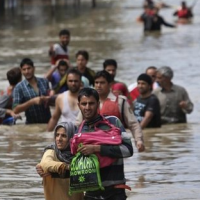Kashmir Floods: Centre Steps in as J&K Govt Flops
 There is mounting anger that the state administration acted too slowly in the flood crisis (photo: AP)
There is mounting anger that the state administration acted too slowly in the flood crisis (photo: AP)
Half a million people remain to be rescued in Srinagar, despite the best efforts of the armed forces that have already rescued over 100,000 people in the worst floods seen in Jammu & Kashmir since 1950. Public anger is growing against the state administration that has been conspicuous by its absence. The federal government has been forced to take charge of relief operations, rallying all resources to fill the void left by the local government.
Prime Minister Narendra Modi has pledged "full support" and asked central agencies to ramp up rescue and relief operations in the state. Chairing a high-level emergency meeting on Wednesday, Modi emphasized that immediate attention be given to providing basic necessities like food and water to the affected people.
Following the PM's push, the Centre has dispatching drinking water, skimmed milk and ready-to-eat meals. According to the Times of India, Home Secretary Anil Goswami, who is originally from the state, has been deputed to Srinagar to coordinate the central and state governments' efforts.
To prevent the outbreak of diseases after the water recedes, chlorine tablets are being sent in large numbers to purify water, along with 10 more public health specialists. The Railways is also sending a fresh consignment of 100,000 litres of drinking water to the state.
The armed forces and teams of the National Disaster Response Force (NDRF) are distributing food, water and medicines among people, particularly those who do not want to leave their homes as the water has begun receding.
Rescue teams are struggling to reach thousands of people still marooned one week after the flooding, as public anger mounts over what many describe as the collapse of the civil administration.
No local authorities, civil or police, were on the ground in Srinagar as people jostled for boats, and those rescued from flooded homes in a dehydrated condition desperately looked for transport, medicines, food and shelter.
According to sources, the state administration had not even set up a communication and coordination system with the central forces, leaving rescue teams unaware of relief camps where rescued victims could be housed.
The army has deployed about 30,000 troops for rescue and relief operations, and soldiers distributed 224,000 litres of water and food to survivors.
Many people praised the army on social media for its efforts, but others vented their anger at delays in getting help to survivors.
"Our ministers were busy evacuating their own people and VIPs in the first few days of the floods and disappeared thereafter. Have you seen Jammu and Kashmir politicians and policemen anywhere?” said local resident Mohammad Hassan Wani.
“All top officials of the administration trapped in floods were airlifted, so were international tourists from Dal Lake. They had their own priority list," he told the Hindustan Times.
In response, Chief Minister Omar Abdullah said on Thursday, "My government couldn't respond in the first 24 hours as we didn't have a government."
“I started rebuilding efforts with six people in a room. My secretariat, the police headquarters, the control room, fire services, hospitals, all the infrastructure was under water," he told NDTV. "I had no cellphone and no connectivity."
It is clear that the state administration will be held to account by voters. J&K is the only flood-prone state in India not to have a flood warning system. According to the Hindustan Times, a proposal by the Central Water Commission (CWC) to set up flood-monitoring stations has been pending for more than five years.
The next state election is scheduled this year, though it may be delayed due to the severity of the flooding. But that will not be enough for Abdullah and his party, the ruling National Conference, which is likely to bear the brunt of popular anger at the ballot box when the election is eventually held.
To Learn More:
Centre takes charge of relief operations in J&K as Omar govt goes ‘missing’ (The Times of India)
J&K floods: Army sets up 19 relief camps, nearly 1 lakh people rescued so far (by Ritesh Srivastava, Zee News)
Anger grows amid flood disaster in Kashmir and Pakistan (by Andrew North, BBC News)
Jammu and Kashmir Floods: 'I Had No Government', Omar Abdullah Tells NDTV (NDTV)
J-K is the only flood-prone state without a flood warning system (by Saikat Datta, Hindustan Times)
- Top Stories
- Controversies
- Where is the Money Going?
- India and the World
- Appointments and Resignations
- Unusual News
- Latest News
- India College Chain’s Expansion into U.S. Draws Opposition from Massachusetts Officials over Quality of Education
- Milk Shortages in India Tied to Release of New Movies Featuring Nation’s Favorite Stars
- Confusion Swirls around Kashmir Newspaper Ban in Wake of Violent Street Protests
- Polio-Free for 5 Years, India Launches Vaccine Drive after Polio Strain Discovery
- New Aviation Policy Could Increase Service, Lower Ticket Prices






Comments